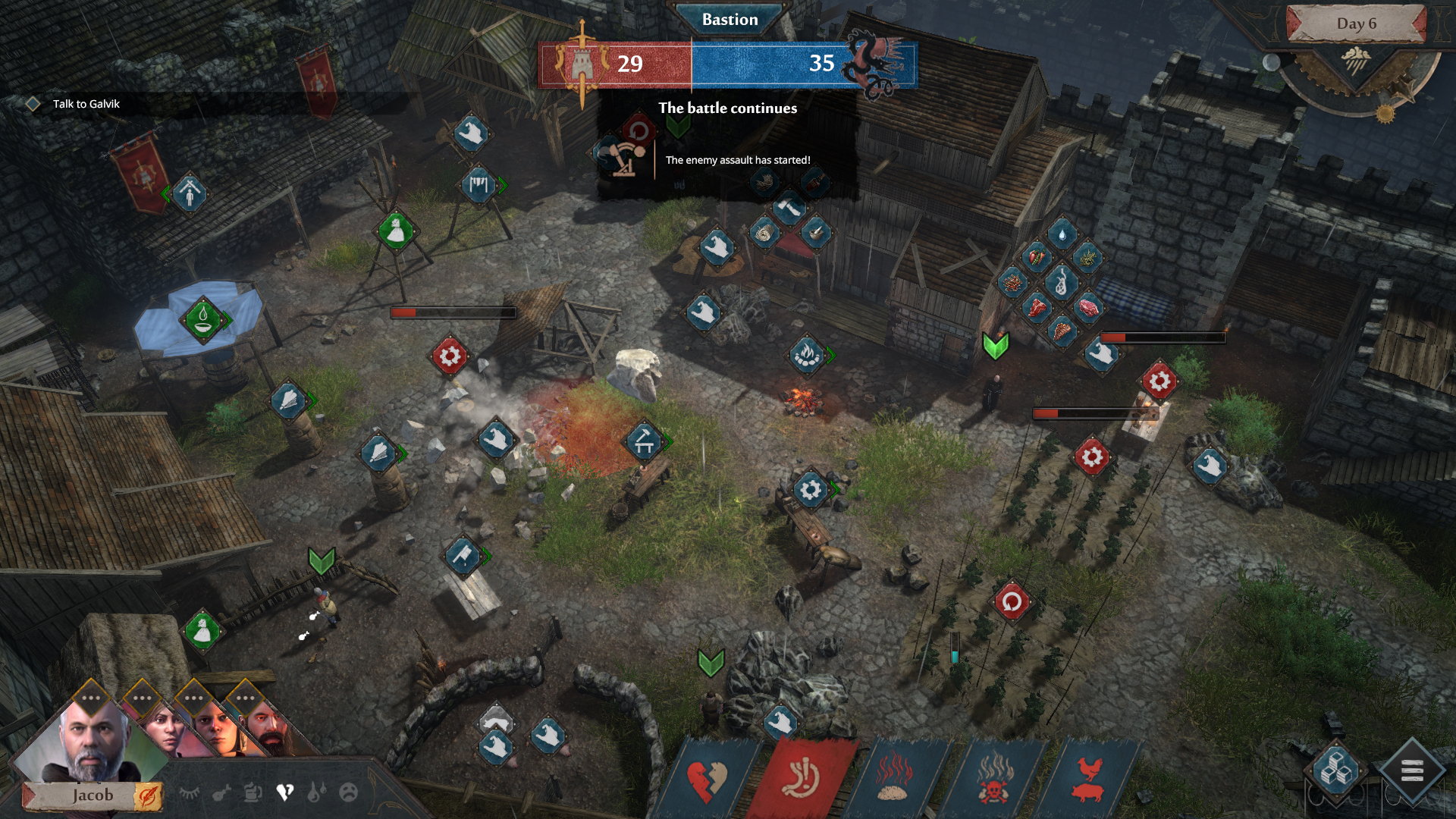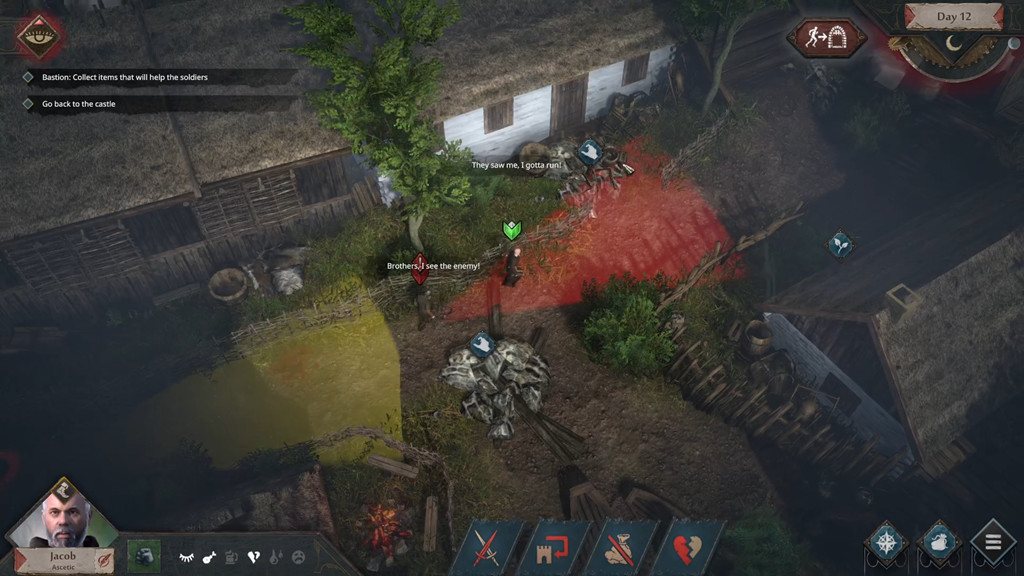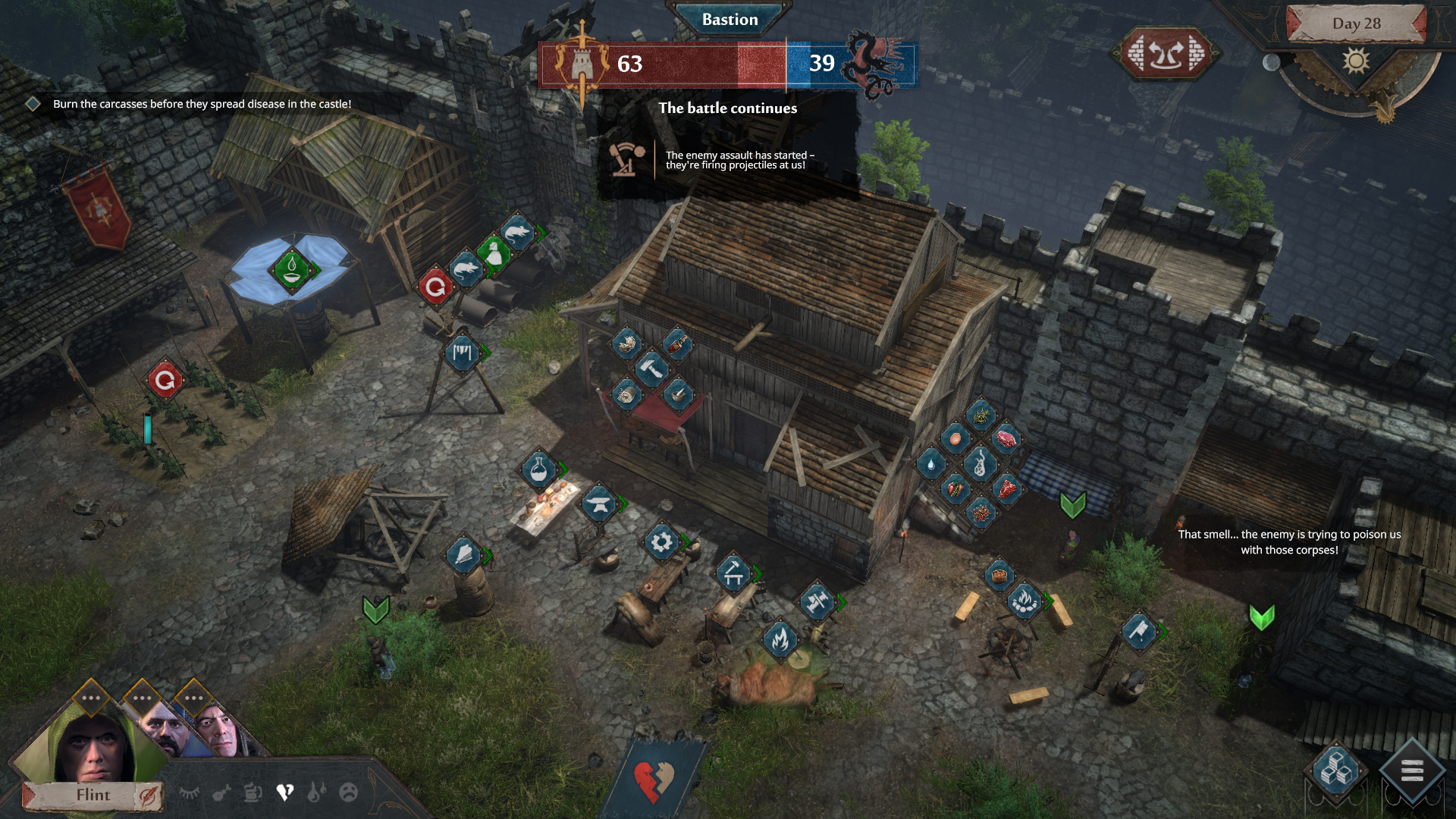Siege Survival isn't kidding around about being a survival game
Think 'This War of Mine' only it's inside a medieval city under siege. Brutal.

Things are off to a rough start. My character, Flint, is starving. My other character, Bertam, is starving. (He's also dying of thirst, and sick from spending too much time near a rotting corpse, and depressed from his entire family dying.) My chickens are starving. My pigs are no longer starving, but only because they just starved to death.
But it's not all bad news. The soldiers defending the castle I'm hiding in… oh, wait, sorry, they're also starving. I have one egg I can make into a meal, so at least one of us can eat. But I'm out of firewood, so Flint just eats it raw and hopes for the best.
Siege Survival: Gloria Victis isn't kidding around about being a survival game. If the way you make a meal in a survival game is by mixing one ingredient with another ingredient and cooking it over a pile of burning wood, the way they made Siege Survival was by mixing survival with more survival and cooking it over a pile of burning survival.
It's a resource management game reminiscent of This War of Mine, though the setting here is a medieval city under siege. A mysterious army has invaded and brutally sacked the city, and the last lines of defense are the castle walls and a handful of remaining soldiers who have to engage in battles with the invaders on a nearly daily basis. Playing as a small group of villagers inside the walls, by day you rush around the castle grounds crafting and building and trying not to starve to death while supplying your army with whatever meagre supplies you can spare, like food, water, and arrows. By night you carefully leave the castle and scavenge the occupied city using stealth to avoid patrolling enemies.
Day or night, Siege Survival is a big bundle of stress. There are too many mouths to feed, even though there aren't that many mouths to feed because almost everyone is dead. There are loads of tasks to accomplish in what feels like not enough time, from tending to livestock to cooking meals to repairing weapons to building new crafting stations. Your villagers need to sleep, too, and there never seems to be a great time to enjoy a nap. It doesn't help that the invaders will not only clash with soldiers on the wall but catapult rocks or fire burning arrows over the wall into your tiny little castle courtyard. The rocks, at least, you can salvage and give to your soldiers to throw back. It's a weird feeling to be grateful someone tried to kill you with a boulder because it means adding some stone to your supply cache. If only they'd hurl in some steaks or soup.

At night you can choose a character to sneak around in the city, which is stressful as hell. With only a limited amount of inventory slots you don't want to bring much with you, but you don't want to bring nothing—if your character is lacking food and water they might grow too tired to effectively loot, not to mention be too exhausted to run away from soldiers. You might want to bring a torch, too, to burn up rotting corpses that spread disease.
The patrolling soldiers don't just have a cone of vision, but keen ears. If you make too much noise with your rubble rummaging, or if you run instead of walk through the dark city alleyways, they'll hear you and become alerted. You can duck behind cover to hide, but any time spent crouching in a hedge is time you're not spending finding food, water, and supplies. And if you're spotted, even if you escape, more soldiers will be on patrol the next few nights.
The biggest gaming news, reviews and hardware deals
Keep up to date with the most important stories and the best deals, as picked by the PC Gamer team.
Even successful scavenging runs can be stressful simply because you find so much stuff you can't carry it all back. It hurts to leave behind extra wood you really need because you found vegetables you need even more.
When the night is over, it's time to divvy up your haul, which in the light of day seems dismal for all that time spent creeping around. Maybe there's enough for your characters to have a drink of water or cook a few meals, and a handful of bricks to send up to the soldiers on the wall to chuck at the invaders. My finest moment was finding enough materials to craft tools and repair an axe—a single axe—so at least one soldier could hold a decent weapon in the next day's battle.
There are little narrative events, too, of the extremely grim variety. As my character Flint I was sneaking through the city, desperately looking for clean water and not finding any no matter how many locations I rummaged through. I found a drunk old man in a cabin and decided I had to rob him rather than leave him alone, on the off chance he had a few swallows of water somewhere in his home. The old man left the cabin and hanged himself from a tree. And I didn't find any water. Flint died of thirst a few minutes later, and he wasn't in a great mood when he did.

Yeah, Siege Survival is rough. It's tense and stressful and frankly pretty depressing (I haven't played This War of Mine, but I understand it's quite the ordeal). But it's got a great resource management system that really makes you feel like you're wrestling with some tough choices at every turn. Narrative events are tricky, too. I always want to do the right thing, like not robbing an old drunk man, but with circumstances so dire it's not always easy to make the morally sound choice. Sometimes you have to think of yourself first and not risk everything just to be nice to a stranger.
Usually, recruiting new characters in a game like this is a relief. There are more hands to do the work, even though there are a few more mouths to feed. But when I send my other character Bertram (the sick, depressed one) out into the city and meet two survivors, I feel like I should tell them to just run straight into an enemy's spear rather than joining me in the castle. At least their death will be quick.
I can't do that, though, so now the three of us are all gathered in the courtyard next to Flint's burning corpse (I don't want him to spread disease), readying for another grim day of scrounging barely enough food to survive, hardly enough water to drink, and hoping a couple of boulders get thrown over the walls at our heads. We don't want to die, but we could use a bit more stone.

Chris started playing PC games in the 1980s, started writing about them in the early 2000s, and (finally) started getting paid to write about them in the late 2000s. Following a few years as a regular freelancer, PC Gamer hired him in 2014, probably so he'd stop emailing them asking for more work. Chris has a love-hate relationship with survival games and an unhealthy fascination with the inner lives of NPCs. He's also a fan of offbeat simulation games, mods, and ignoring storylines in RPGs so he can make up his own.

